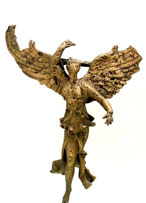| Author | |
|---|---|
| Epoch | XIV c. |
| Work | The sixty-first king, Rusudan, daughter of Queen Tamar and sister of king Lasha-Giorgi, Bagrationi (Life of Kartli, text identified based on all key manuscripts by S. Kaukhchishvili, v. II, 1959) |
| Type | |
| Quote | “As a creator of words would say about Macedonian, he visited Midas’ place [as a guest, - E. K.], suffering from headache and it is suspected, that Midas and Antipatros gave him some drug [poison, - E. K.]” (pg. 268) |
| Term |
|

| Comment | Iv. Javakhishvili understands creator of words as a historian (Historical Writing, Tbilisi, 1916, pg. 183). G. Mamulia: “The first great creators of words”, in the opinion of Tamar’s historian, were generally called “Shemsxmeli” historians of the antique period (e.g. Homer, Plutarch, the author of the novel on Alexander etc.), who in modern understanding are writers and not historians (G. Mamulia, The Issues of the Peoples of Caucasus, pg. 241-246). T Khaukhchishvili: Georgian phrase “creator of words” is literally Greek λογοποιός. This word has different meanings in Greek itself. If e.g. we consider this place as taken out from pseudo-Callisthenes’ novel, the “creator of words” will be a “novelist”, but, if say, - from Aristobulus’ history, than the “creator of words” will be a historian” (T. Khaukhchishvili, Antique World in Georgian Historiography, Chronicler, Collection of Works Dedicated to 100th Anniversary of Iv. Javakhishvili’s Birth, Tbilisi, 1976, pg, 295). P. Ingoorokhva: “This place has been taken out from Alexander’s novel” (P. Ingorokhva, Giorgi Merchule, pp. 554-558). This fragment, as provided by the chronicler, is understandable, - the author uses that version of Alexander’s life, where Midas of Thessaly is among the killers of the king. At the same time there is a question – can Midas be a distorted form of Iollos? In “Deeds of Alexander” the first to poison was Iollos, who was the king’s wine-scooper and Midas’ name, in this context, appears only in connection with Ariann and Justine. But according to other data, these authors do not seem to have been known to the chronicler (or any of the historians mentioned above). (T. Khaukhchishvili, Antique World in Georgian Historiography, Chronicler, Collection of Works Dedicated to 100th Anniversary of Iv. Javakhishvili’s Birth, Tbilisi, 1976, pg. 296). |
|---|

